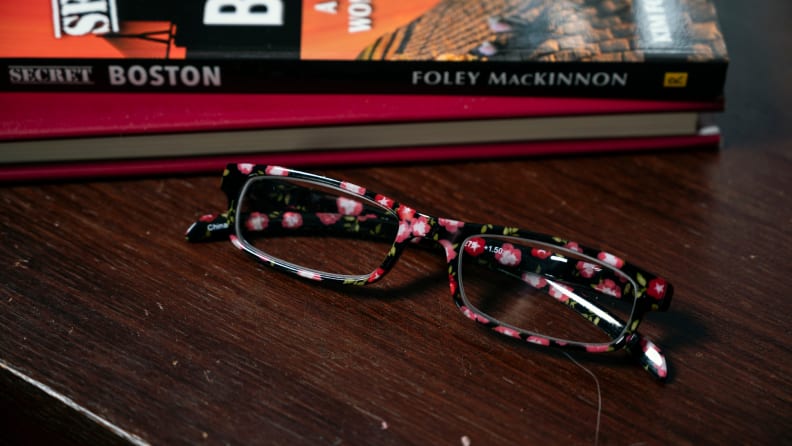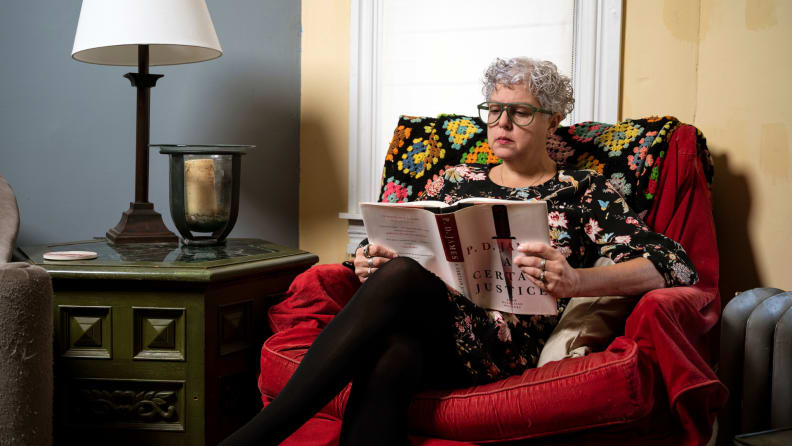How to tell if you need reading glasses, according to eye doctors
Feast your eyes on this advice so you can read the next article without squinting.
Products are chosen independently by our editors. Purchases made through our links may earn us a commission.
As the years pass, it seems as though everyone needs a little help seeing things more clearly. Or, to be more specific, reading things more clearly. Maybe it’s a menu with print that’s a bit too small, and no matter how you move it around, you still can’t make it out. Or maybe you realize you keep increasing the font on your computer to see the screen better. Sound familiar? Don't worry, you aren't alone—at least, that's how it happened for me.
I spoke to a couple of eye doctors about how to tell if you need reading glasses (known to most wearers as “readers”) and for some tips on choosing the right pair for you.
Who needs readers?

Almost everyone will need reading glasses eventually.
It’s entirely normal to need readers at some point, according to Dr. Cari Cannon, founder of Cannon Eyecare in Boston. “As we approach our 40s and 50s, the muscles in our eyes relax and we have more difficulty changing focus from distance to near and back again,” she says. (Full disclosure: Dr. Cannon happens to be my own optometrist.)
In addition, people who suffer from eye strain and fatigue from extensive device use—which, let’s face it, is many of us these days—could benefit from near vision correction. Our eyes can feel tired, fatigued, or sore, and have difficulty focusing, causing our vision to become blurred, especially with close-up items.
If you start to notice that you keep holding books or other reading materials further and further away from your eyes to read, or you can’t see small print in low light, or you're simply getting headaches whenever you're reading, it may be time to consider readers.
Do you need a prescription for readers?
According to both Dr. Natasha Herz, a clinical spokesperson for the American Academy of Ophthalmology, and Cannon, picking up readers at a drugstore or online is okay if you're just looking for a little help. But both doctors stress it’s important to get a baseline eye exam at some point to make sure your eyes are healthy.
“If you are somebody that has never needed a prescription, you can go to the pharmacy for the weakest prescription glasses,” says Herz. “But if you haven’t been to your doctor or haven’t needed to before, it is just a good idea in your mid-40s to get a baseline medical exam to make sure it's just natural aging.”
How do I know what strength reading glasses I need?
When left to their own devices in the drugstore aisle, many people choose the lowest number that allows them to see "better," though this is often inadequate for long term use, according to Cannon. If you want a precise prescription, you’ll have to get an exam. It is impossible to know the power your eyes really need unless you have an eye exam, where the power is measured and calibrated to your working distance.
Is it okay to buy readers online?
Cannon says that once you know the appropriate power for your goal task, ordering online is an option. “I always recommend having at least one ‘good pair’ of glasses that are made for your working distance, and have several pairs of ‘cheaters’ around the house for quick tasks.”
For my part, during my annual exam, I complained of my eyes feeling fatigued and she suggested the lowest prescription of readers, +1.00, and said it was fine to order from wherever I liked. (And that would be Herz's advice for uncomplicated prescriptions as well.) Since then, I’ve ordered from several online glasses retailers. My favorite is Warby Parker, which allows you to pick five different frames to try on and only pay for the one you end up keeping.
Do readers make your vision worse?

Reading glasses help your vision—just don’t wear them all day.
Both doctors debunk the idea that readers make your vision worse. “The reality is, our eyes will change no matter what we do, so we might as well use tools [glasses] to see clearly and comfortably,” says Cannon. “Our near vision continues to change into our 60s, whether we wear glasses or not.”
One thing you may want to avoid, however, is wearing readers on all day. They're designed to focus at one distance, which may not be adequate for everything you want to do. If you prefer how you see with your reading glasses than without, this might be the time to get a proper exam to see if you need glasses intended for all-day wear.
Should you use blue light-blocking readers?
Blue light-blocking glasses claim to reduce eyestrain and fatigue, often by using yellow-tinged lenses to filter out some of the artificial light from devices. These kinds of glasses can work, but Cannon says she prefers to recommend anti-reflective lenses over yellow ones. “Anti-reflective coating reduces glare from overhead lighting and off devices, thus reducing eye strain and providing more clear vision,” says Cannon. “Yellow increases contrast, but causes color distortion.”
To reduce eye strain, you can also adjust the lighting on your computer to make it less bright and easier for your eyes, says Herz. But the best course of action may be to follow what Cannon calls the 20-20-20 rule. This entails looking 20 feet away 20 seconds every 20 minutes. This can keep our eyes more comfortable by helping them "unstick" from close-up screens and pages.
Should I feel weird about needing readers?

Reading glasses come in a wide range of styles that allow you to show off your personality.
Needing readers is just a part of life, something to be addressed as we get older, and certainly no cause for embarrassment. If you're worried about your vision, the best course of action is to consult with your doctor. Once you know your prescription, you can find some fun glasses that suit your personality, your lifestyle, or even your clothes. Some readers are so inexpensive, you can swap them out daily to suit your mood. Showing off your sense of style is fun—and being able to see well is even better.
The product experts at Reviewed have all your shopping needs covered. Follow Reviewed on Facebook, Twitter, and Instagram for the latest deals, product reviews, and more.


